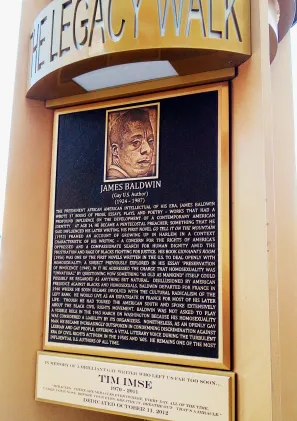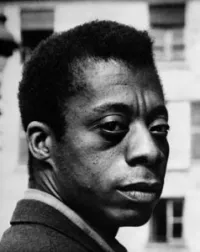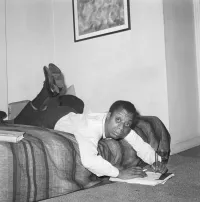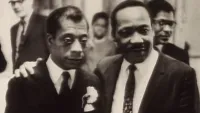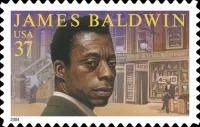Plaque Sponsor
In memory of a brilliant gay writer who left us far too soon Tim Imse (1970-2011) who said "Miracles, there are miracles everywhere, everyday, all of the time, under your nose, before your eyes, breathe in, breathe out - that's a miracle."Biography
1924 - 1987
“Love does not begin and end the way we seem to think it does. Love is a battle, love is a war; love is a growing up.”
- James Baldwin
The preeminent African American intellectual of his era, James Baldwin wrote 17 books of prose, essays, plays, and poetry – works that had a profound influence on the development of a contemporary American identity. At age 14, he became a Pentecostal preacher; something that he said influenced his later writing. His first novel Go Tell It on the Mountain (1953) framed an account of growing up in Harlem in a context characteristic of his writing – a concern for the rights of America’s oppressed and a compassionate search for human dignity amid the frustration and rage of blacks fighting for justice. His book Giovanni’s Room (1956) was one of the first novels written in the U.S. to deal openly with homosexuality; a subject previously explored in his essay ‘Preservation of Innocence’ (1949). In it he addressed the charge that homosexuality was “unnatural” by questioning how something “as old as mankind” itself could possibly be regarded as anything but natural. Disillusioned by American prejudice against blacks and homosexuals, Baldwin departed for France in 1948 where he soon became involved with the cultural radicalism of the Left Bank. He would live as an expatriate in France for most of his later life. Though he had toured the American South and spoke extensively about the Black Civil Rights Movement, Baldwin was not asked to play a visible role in the 1963 March on Washington because his homosexuality was considered a liability by its organizers. Nonetheless, as an openly gay man, he became increasingly outspoken in condemning discrimination against lesbian and gay people, offering a vital literary voice during the turbulent era of civil rights activism in the 1950s and '60s. He remains one of the most influential U.S. authors of all time.
VIEW ENLARGED BALDWIN BRONZE MEMORIAL
1924 - 1987
“Love does not begin and end the way we seem to think it does. Love is a battle, love is a war; love is a growing up.”
- James Baldwin
The preeminent African American intellectual of his era, James Baldwin wrote 17 books of prose, essays, plays, and poetry – works that had a profound influence on the development of a contemporary American identity. At age 14, he became a Pentecostal preacher; something that he said influenced his later writing. His first novel Go Tell It on the Mountain (1953) framed an account of growing up in Harlem in a context characteristic of his writing – a concern for the rights of America’s oppressed and a compassionate search for human dignity amid the frustration and rage of blacks fighting for justice. His book Giovanni’s Room (1956) was one of the first novels written in the U.S. to deal openly with homosexuality; a subject previously explored in his essay ‘Preservation of Innocence’ (1949). In it he addressed the charge that homosexuality was “unnatural” by questioning how something “as old as mankind” itself could possibly be regarded as anything but natural. Disillusioned by American prejudice against blacks and homosexuals, Baldwin departed for France in 1948 where he soon became involved with the cultural radicalism of the Left Bank. He would live as an expatriate in France for most of his later life. Though he had toured the American South and spoke extensively about the Black Civil Rights Movement, Baldwin was not asked to play a visible role in the 1963 March on Washington because his homosexuality was considered a liability by its organizers. Nonetheless, as an openly gay man, he became increasingly outspoken in condemning discrimination against lesbian and gay people, offering a vital literary voice during the turbulent era of civil rights activism in the 1950s and '60s. He remains one of the most influential U.S. authors of all time.
VIEW ENLARGED BALDWIN BRONZE MEMORIAL
Lesson Plan
Please login or register for an account to view this lesson plan.
Demography
Demography
Gender Male
Sexual Orientation Gay
Gender Identity Cisgender
Ethnicity African American Black
Nations Affiliated France Switzerland Türkiye United States
Era/Epoch Civil Rights Movement (1954-1968) Cold War (1945-1991) Information Age (1970-present) Post-Stonewall Era (1974-1980)
Field(s) of Contribution
Advocacy & Activism
Art, Music, Literature & Theater
Author
Editor
Journalism
Media & Communications
Poet
Social Justice
Social Sciences
Theater
US History
Commemorations & Honors
Time Magazine Cover (1963)
National James Baldwin Literary Society Founded (1987)
James Baldwin Scholars Programs Established at Hampshire College in Amherst, Massachusetts (1992)
U.S. Postal Service Commemorative Stamp (2005)
James Baldwin Place Named in New York City (2014)
The New School's University Center Social Justice Hub Named the Baldwin Rivera Boggs Center After Activists James Baldwin, Sylvia Rivera, and Grace Lee Boggs (2014)
Inaugural San Francisco Rainbow Honor Walk Honoree (2014)
East 128th Street, between Fifth and Madison Avenues Where he Lived Renamed James Baldwin Place (2014)
I Am Not Your Negro Documentary Released (2016)
National LGBTQ Wall of Honor at the Stonewall National Monument Inductee (2019)
Baldwin's Upper West Side Residence Given Landmark Status by New York City's Preservation Commission (2019)
Demography
Gender Male
Sexual Orientation Gay
Gender Identity Cisgender
Ethnicity African American Black
Nations Affiliated France Switzerland Türkiye United States
Era/Epoch Civil Rights Movement (1954-1968) Cold War (1945-1991) Information Age (1970-present) Post-Stonewall Era (1974-1980)
Field(s) of Contribution
Advocacy & Activism
Art, Music, Literature & Theater
Author
Editor
Journalism
Media & Communications
Poet
Social Justice
Social Sciences
Theater
US History
Commemorations & Honors
Time Magazine Cover (1963)
National James Baldwin Literary Society Founded (1987)
James Baldwin Scholars Programs Established at Hampshire College in Amherst, Massachusetts (1992)
U.S. Postal Service Commemorative Stamp (2005)
James Baldwin Place Named in New York City (2014)
The New School's University Center Social Justice Hub Named the Baldwin Rivera Boggs Center After Activists James Baldwin, Sylvia Rivera, and Grace Lee Boggs (2014)
Inaugural San Francisco Rainbow Honor Walk Honoree (2014)
East 128th Street, between Fifth and Madison Avenues Where he Lived Renamed James Baldwin Place (2014)
I Am Not Your Negro Documentary Released (2016)
National LGBTQ Wall of Honor at the Stonewall National Monument Inductee (2019)
Baldwin's Upper West Side Residence Given Landmark Status by New York City's Preservation Commission (2019)
Resources
Resources
Adams, Stephen. The Homosexual as Hero in Contemporary Fiction. London: Vision Press, 1980.
Bergman, David. Gaiety Transfigured: Gay Self-Representation in American Literature. Madison: University of Wisconsin Press, 1991.
Bigsby, C. W. E. "The Divided Mind of James Baldwin." Journal of American Studies 14 (1980): 325-342.
Bloom, Harold, ed. James Baldwin. New York: Chelsea House, 1986.
Campbell, James. Talking at the Gates: A Life of James Baldwin. New York: Viking, 1991.
Cederstrom, Lorelei. "Love, Race and Sex in the Novels of James Baldwin." Mosaic 17.2 (1984): 175-188.
Cohen, William A. "Liberalism, Libido, Liberation: Baldwin's Another Country." Genders 12 (Winter 1991): 1-21.
Giles, James R. "Religious Alienation and 'Homosexual Consciousness' in City of Night and Go Tell It on the Mountain." College English 36 (November 1974): 369-380.
Harris, Trudier. Black Women in the Fiction of James Baldwin. Knoxville: University of Tennessee Press, 1985.
Kenan, Randall and Sickels, James Baldwin (Gay & Lesbian Writers). New York: Chelsea House Pub, 2005.
Kinnamon, Keneth, ed. James Baldwin: A Collection of Critical Essays. Englewood Cliffs, N.J.: Prentice Hall, 1974.
Leeming, David. James Baldwin: A Biography. New York: Knopf, 1994.
Lowenstein, Andrea. "James Baldwin and His Critics." Gay Community News (February 9, 1980): 11-12, 17.
Macebuh, Stanley. James Baldwin: A Critical Study. New York: The Third Press, 1973.
Nelson, Emmanuel S. "James Baldwin." Contemporary Gay American Novelists: A Bio-Bibliographical Critical Sourcebook. Emmanuel S. Nelson, ed. Westport, Conn.: Greenwood Press, 1993. 6--24.
Nelson, Emmaunel S. "James Baldwin's Vision of Otherness and Community." MELUS 10.2 (1983): 27-31.
Sarotte, Georges-Michel. Like a Brother, Like a Lover: Male Homosexuality in the American Novel and Theatre from Herman Melville to James Baldwin. Garden City, N.Y.: Anchor Press/Doubleday, 1978.
Summers, Claude J. Gay Fictions: Wilde to Stonewall. New York: Continuum, 1990.
Trope, Quincey, ed. James Baldwin: The Legacy. New York: Simon & Schuster, 1989.
https://www.biography.com/people/james-baldwin-9196635
https://time.com/5859214/james-baldwin-racism/
https://www.newyorker.com/books/page-turner/the-history-that-james-baldwin-wanted-america-to-see
https://www.nbcnews.com/feature/nbc-out/james-baldwin-s-sexuality-complicated-influential-n717706
https://www.brainpickings.org/2017/05/09/james-baldwin-richard-goldstein-village-voice-interview/
http://outhistory.org/exhibits/show/aa-history-month-bios/james-baldwin
Resources
Adams, Stephen. The Homosexual as Hero in Contemporary Fiction. London: Vision Press, 1980.
Bergman, David. Gaiety Transfigured: Gay Self-Representation in American Literature. Madison: University of Wisconsin Press, 1991.
Bigsby, C. W. E. "The Divided Mind of James Baldwin." Journal of American Studies 14 (1980): 325-342.
Bloom, Harold, ed. James Baldwin. New York: Chelsea House, 1986.
Campbell, James. Talking at the Gates: A Life of James Baldwin. New York: Viking, 1991.
Cederstrom, Lorelei. "Love, Race and Sex in the Novels of James Baldwin." Mosaic 17.2 (1984): 175-188.
Cohen, William A. "Liberalism, Libido, Liberation: Baldwin's Another Country." Genders 12 (Winter 1991): 1-21.
Giles, James R. "Religious Alienation and 'Homosexual Consciousness' in City of Night and Go Tell It on the Mountain." College English 36 (November 1974): 369-380.
Harris, Trudier. Black Women in the Fiction of James Baldwin. Knoxville: University of Tennessee Press, 1985.
Kenan, Randall and Sickels, James Baldwin (Gay & Lesbian Writers). New York: Chelsea House Pub, 2005.
Kinnamon, Keneth, ed. James Baldwin: A Collection of Critical Essays. Englewood Cliffs, N.J.: Prentice Hall, 1974.
Leeming, David. James Baldwin: A Biography. New York: Knopf, 1994.
Lowenstein, Andrea. "James Baldwin and His Critics." Gay Community News (February 9, 1980): 11-12, 17.
Macebuh, Stanley. James Baldwin: A Critical Study. New York: The Third Press, 1973.
Nelson, Emmanuel S. "James Baldwin." Contemporary Gay American Novelists: A Bio-Bibliographical Critical Sourcebook. Emmanuel S. Nelson, ed. Westport, Conn.: Greenwood Press, 1993. 6--24.
Nelson, Emmaunel S. "James Baldwin's Vision of Otherness and Community." MELUS 10.2 (1983): 27-31.
Sarotte, Georges-Michel. Like a Brother, Like a Lover: Male Homosexuality in the American Novel and Theatre from Herman Melville to James Baldwin. Garden City, N.Y.: Anchor Press/Doubleday, 1978.
Summers, Claude J. Gay Fictions: Wilde to Stonewall. New York: Continuum, 1990.
Trope, Quincey, ed. James Baldwin: The Legacy. New York: Simon & Schuster, 1989.
https://www.biography.com/people/james-baldwin-9196635
https://time.com/5859214/james-baldwin-racism/
https://www.newyorker.com/books/page-turner/the-history-that-james-baldwin-wanted-america-to-see
https://www.nbcnews.com/feature/nbc-out/james-baldwin-s-sexuality-complicated-influential-n717706
https://www.brainpickings.org/2017/05/09/james-baldwin-richard-goldstein-village-voice-interview/
http://outhistory.org/exhibits/show/aa-history-month-bios/james-baldwin
